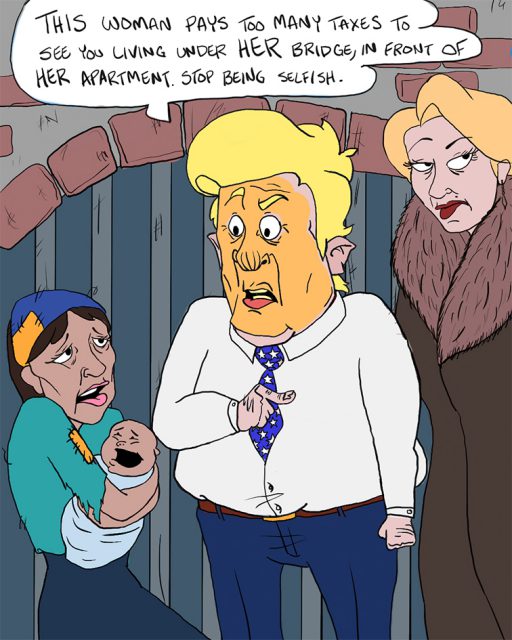| October 2, 2019 | Editorial |
|---|
Never has one quote so perfectly exemplified an entire administration than the quote President Trump gave reporters on Sept. 17 in regards to his council’s new plan to fix the massive homeless problem in California.
The plan involves tearing down tent cities and homeless havens like Skid Row in Los Angeles and bolstering the police presence in places where the homeless population congregate.
While the plan is very unclear, it’s the way Trump chose to speak on the issue that bodes poorly for progress.
One would think the president’s comments directed at this sensitive, life-and-death issue would be tactfully and carefully chosen, but the president clearly had something other than those suffering in mind.
“We have people living in our best highways, our best streets, our best entrances to buildings, where people in those buildings pay tremendous taxes.”
Trump told this to reporters while aboard Air Force One, the farthest place imaginable from the harsh and unforgiving streets that is home to over 500,000 Americans.
Experience being homeless isn’t a requirement to feel empathy for homeless individuals, but Trump seems dead set on eradicating it in the most Trumpian way possible: through dollar sign-filled eyes.
The president’s comments seemed to focus on the rich that contribute via taxes and how the homeless population affect them in a negative way, rather than feeling empathy for those who actually need aid.
He also implied in this quote that the visual blemish of human suffering and extreme poverty make America’s beautiful roads less worthy of their prestigious title of “best,” as if homelessness is always a choice.
This is a slap in the face of those who live their lives without a place to call home, and a terrifyingly dystopian reality that includes the President of the United States prioritizing profit over his fellow Americans.
Speaking this way about one of the most abused and marginalized groups speaks volumes about Trump’s priority list, and fits in perfectly with his consistently anti-poor views and actions.
Trump has hurt programs like Medicare, and even seems to be contributing to the problem alongside U.S. Secretary of Housing and Urban Development Ben Carson by proposing rules that disallow illegal immigrants from using federal housing benefits, a move that could displace thousands of legal adults and children.
The idea of suit-clad politicians sticking their greedy noses into the business of the poor they have failed to protect seems like enough reason to be skeptical of a plan like this making things better.
Mental health and drug abuse are common causes for homelessness, yet the system set in place now punishes those with these afflictions by pushing them in and out of jail and making it impossible for them to get a job even if they recover.
A lot can be deduced from the way a person treats the disadvantaged, and in the same way, a lot of conclusions can be drawn about a country as a whole by how they treat their poor.
Trump has not made any indication that his sudden interest in fixing homelessness came from a place of love and empathy, but instead reinforced the negative qualities that many Americans associate with Trump.
And along with basic human decency and compassion, Americans seem more and more likely to ask Trump to kindly push his mountain of cash and profit potential to the side and look at homelessness the way it ought to be looked at: as people tragically suffering.

